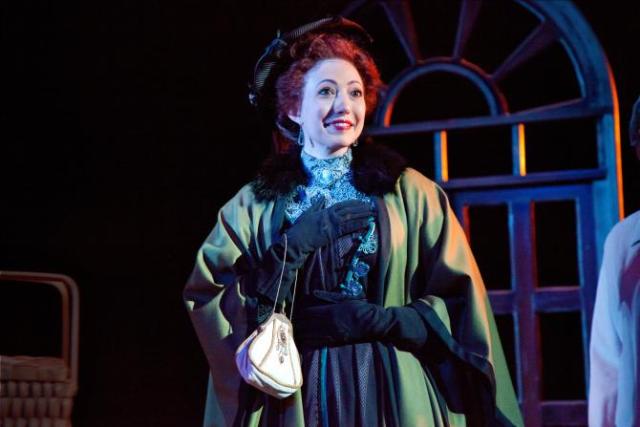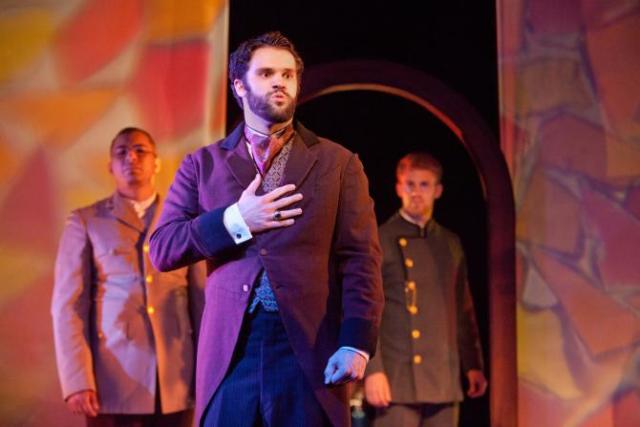

Anton Chekhov’s iconic play, The Cherry Orchard, lurks in the FSU/Asolo Conservatory’s mishmash production but is hard to find in the chopped-up interpretations of characters and action. Though it’s about the passing of an old order--symbolized by the Renevskaya orchard--to a new one, it’s a strain to find out who’s who and why they’re what they are.
A saving grace is that one of the best performances is Joe Knispel’s as Lopakhin. The rich former peasant, who wants the orchard turned into a real-estate development, is typically aware of time as he awaits the owner’s entrance. When the far too young and unconvincing Lisa Woods, as uncomprehending Madame Lyubov Ranevskaya, appears with entourage, it’s not the circus parade it should be. Still, Mark Comer, almost adequately made up as old servant Firs, represents well the old order, happy to be a serf to his mistress once again.
Though the Chekhovian characters are almost all self-absorbed, at one point speaking in soliloquies rather than in mutual conversation or listening to one another, they simply deliver lines in this production. Only perpetual student Trofimov can make long speeches work, but Chris Alexey Diaz’s enthusiasm wanes before his Trofimov’s messages end. Any import in the exchange between Kelsey Petersen’s ambitious maid and Kevin Barber’s valet quickly dissipates as well.
Despite obvious aging make-up and posture, Josh James is believable as funny Pishchik, a neighbor who’s always after money to pay his debts and relies on luck to get it. Evan Reynolds White shows clerk Yepikhodov to be properly clumsy.
Kim Stephenson stands out as Madame Lyubov’s hard-working daughter Varya, representing both old and new order. Her interaction with Lopakhin, whom she loves but who won’t be pinned down, illustrates the best of Chekhov’s contrapuntal realism.
As her sister Anya, who hopes to bring their mother with her into a brighter future, Ally Farzetta almost persuades that’s a possibility--though it’s really quite doubtful.
There’s no translator or, more likely, adaptor mentioned in program or publicity, but the tone of the language is basically colloquial. Good. There’ve been some changes. Not so good. For example, a governess who does magic is played (strangely) by Tom Harney without showing or intimating a reason for the sex change. As Madame’s brother, Jordan Sobel expresses forcefully Gayev’s longing for Paris and disdain for Russia. What happened, though, to greedy Gayev’s fascination with certain kinds of food and billiards? Gone, along with other of Chekhov’s farcical and burlesque elements.
Scenic design mirrors the mix of directorial styles, starting with a semi-representational furnished room. Gayev gushes over an antique bookcase (but it’s exactly like one, bought new, in my childhood home that I can assure was made later than a hundred years before the turn of the 19th into 20th century). Characters downstage look through the absent fourth wall at the cherry orchard, while expressionistic trees are projected upstage and leaves flutter from the top of center stage. A scene follows presentationally in which the actors cover the furnishings with sheets and then play mostly on the proscenium. On the day of the orchard auction, Madame typically seems unaware of or unconcerned with the timing and hosts a dance. Where (ballroom or terrace or . . .?) is uncertain. It takes place upstage behind a semi-sheer curtain holding projections of multicolored pavers or something like them. The dance is said to be a waltz, but that’s not what’s seen being danced. (Movement has generally been awkward.) For the finale, there’s a return to the realistic original room, shuttered from outside and darkened except by a candle. This Cherry Orchard perfectly illustrates Brecht’s description of a production “with a lot of ideas but no Idea.” One would hope that this final Conservatory effort will prove to be, like the Russia of the play, in transition to a new order.
